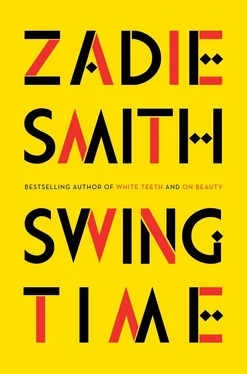I found it in the compartment of her side-table, in a hospital laundry bag, along with a trouser suit, a folder of papers, a guide to parliamentary conduct and her laptop.
“You don’t have to use it,” I said, powering it up and laying it on the table. “But just leave it on so I have a way of contacting you.”
The notification alarm started going off — the phone buzzed and danced across the counter — and my mother looked over at it with a kind of horror.
“No, no, no — I don’t want it! I don’t want it on! Why did you have to do that?”
I picked it up. I could see unopened e-mails, dozens and dozens of them, filling the screen, abusive even in their subject headings, all from the same address. I started reading through them, trying to resist the catalog of pain: child-support woes, rent arrears, skirmishes with social workers. The most recent were the most frantic: she feared her children were about to be taken from her.
“Mum, have you heard from Tracey recently?”
“Where’s Alan Pennington? I’m not going to eat this.”
“My God, you’re so sick right now — you shouldn’t have to be dealing with this!”
“It’s not like Alan not to check in…”
“Mum, have you heard from Tracey?”
“NO! I told you I don’t look at that thing!”
“You haven’t spoken to her?”
She sighed heavily.
“I don’t have many visitors, darling. Miriam comes. Lambert came once. My fellow Members of Parliament do not come. You are here. As Alan Pennington said: ‘You find out who your friends are.’ I sleep mostly. I dream a lot. I dream of Jamaica, I dream of my grandmother. I go back in time…” She closed her eyes. “I did have a dream about your friend, when I first got here, I was on a high dosage of this”—she tugged at a drip in her arm—“Yes, your friend came to visit me. I was asleep and I woke up and she was just standing by the door, not talking. Then I went back to sleep and she was gone.”
• • •
When I got back to the flat, emotionally weak, still jet-lagged, I prayed that Lamin would be out and he was. When he didn’t come back for dinner I was relieved. Only the next morning, when I knocked on his door, nudged it open and saw he and his bag were gone did I realize he’d left. When I called I got voicemail. I called every few hours for four days and it was the same. I had been so concentrated upon how I might break the news to him that he must leave, that we had no future together, that I hadn’t imagined, not for a moment, that all the time he was plotting his own escape from me.
Without him, without the TV on, the flat was deadly quiet. It was just me and the computer, and the radio, from which more than once I heard the voice of the Noted Activist, still going strong, full of opinions. But my own story was fading, online and in all other mediums, all that brightly illuminated commentary already burned out, puttering to blackness and ash. At a loss, I spent a day writing e-mails to Tracey. First dignified and righteous, then sarcastic, then angry, then hysterical, until I realized she was having more effect on me with silence than I could manage with all these words. The power she has over me is the same as it has always been, judgment, and it goes beyond words. There is no case I can make that will change the fact that I was her only witness, the only person who knows all that she has in her, all that’s been ignored and wasted, and yet I still left her back there, in the ranks of the unwitnessed, where you have to scream to get heard. Later I found out Tracey had a long history of sending distressing e-mails. A director at the Tricycle who had not cast her, she thought because of color. The teachers at her son’s school. A nurse at her doctor’s office. But none of this changes the judgment. If she was tormenting my mother as she lay dying, if she was trying to ruin my life, if she was sitting in that claustrophobic little flat, watching my e-mails line up on her phone and simply choosing not to read them — whatever she was doing, I knew it was a form of judgment upon me. I was her sister: I had a sacred duty toward her. Even if only she and I knew it and recognized it, it was still true.
A few times I left the flat for the corner-shop, to buy cigarettes and packets of pasta, but otherwise I saw no one and heard from no one. At night I picked up random books from my mother’s pile, tried to read a little, lost interest and started another. It occurred to me that I was depressed and needed to speak to another human. I sat with my new pay-as-you-go phone in my hand, looking down at the short list of personal names and numbers I’d copied off the old work phone, summarily disconnected, and tried to imagine what form each interaction would take, if and how I could get through it, but every potential conversation felt like a scene from a stage play, in which I’d be playing that person I’d been for so long, who seems to be at lunch with you but is actually turned toward Aimee, working for Aimee, thinking of Aimee, day and night, night and day. I called Fern. The ring was a single long foreign tone and he answered with “ Hola .” He was in Madrid.
“Working?”
“Traveling. It will be my year off. Didn’t you know I quit? But I’m so happy to be free!”
I asked him why, expecting a personal attack, directed at Aimee, but his answer had no personal aspect, he was concerned with the “distorting” effect of her money in the village, the collapse of government services in the area, and the foundation’s naïve, complicit dealings with the government. As he spoke I was reminded and ashamed of a profound difference between us. I had always been quick to interpret everything personally, where Fern had seen the larger, structural problems.
“Well, it’s good to hear from you, Fern.”
“No, you didn’t hear from me. I heard from you.”
He left the silence hanging. The longer it went on, the harder it was to think of what to say.
“Why are you calling me?”
I sat listening to him breathe for another few seconds until my phone ran out of credit.
• • •
About a week later he e-mailed to say he was in London for a short trip. I hadn’t spoken to anyone but my mother in several days. We met up on the South Bank, in the window of the Film Café, sitting side by side, facing the water, and reminisced a little, but it was awkward, I became bitter so easily, every thought pulled toward darkness, to something painful. All I did was complain, and though I could see I was irritating him I couldn’t seem to stop myself.
“Well, we can say that Aimee lives in her bubble,” he said, interrupting me, “and so does your friend and, by the way, so do you. It’s possible that it’s like this for everyone. The size of the bubble is different, this is all. And perhaps the thickness of the — what do you call this in English? — skin — film. The thin layer on a bubble.”
The waiter came, we paid avid attention to him. When he left we watched a tourist boat make its way down the Thames.
“Oh! I know what it is I want to tell you,” he said suddenly, slapping the bar and rattling a saucer. “I heard from Lamin! He is fine — he is in Birmingham. He wanted a letter of reference from me. He hopes to study. We e-mailed a little bit. I learn that Lamin is a fatalist. He wrote to me: ‘It was intended for me to come to Birmingham. So I was always coming here.’ Isn’t that funny? No? Well, maybe I use the wrong word in English. I mean that for Lamin the future is as certain as the past. It is a theory from philosophy.”
“Sounds like a nightmare.”
Fern looked puzzled again: “Maybe I put it wrong, I’m not a philosopher. To me it means something simple, like to say the future is already there, waiting for you. Why not wait, see what it brings?”
Читать дальше












